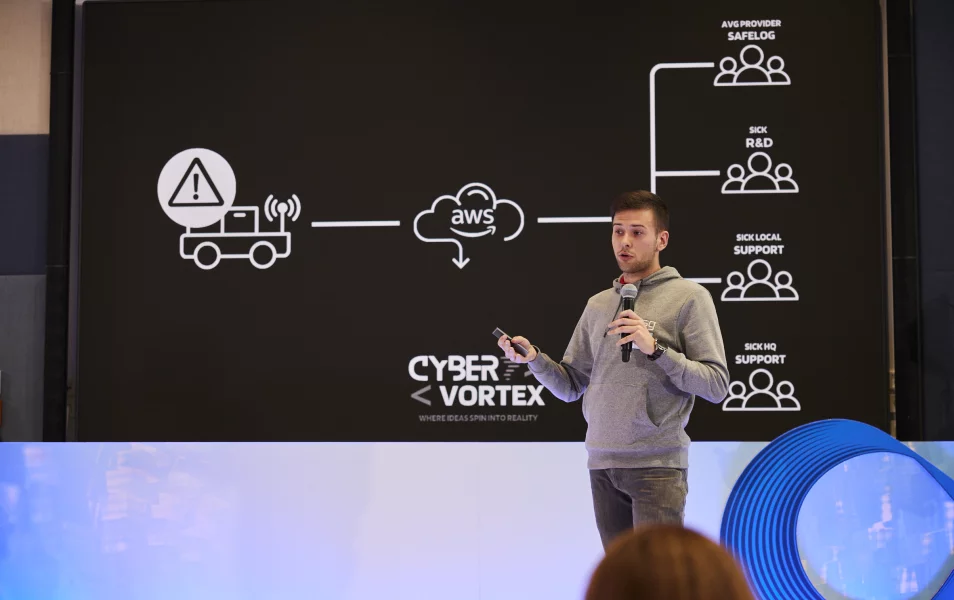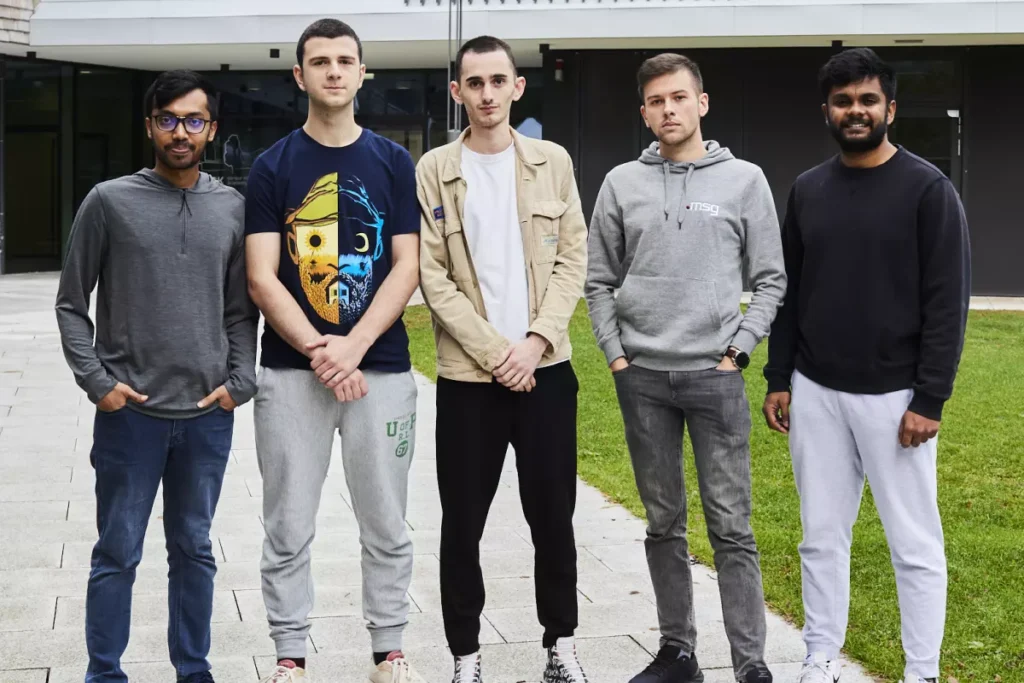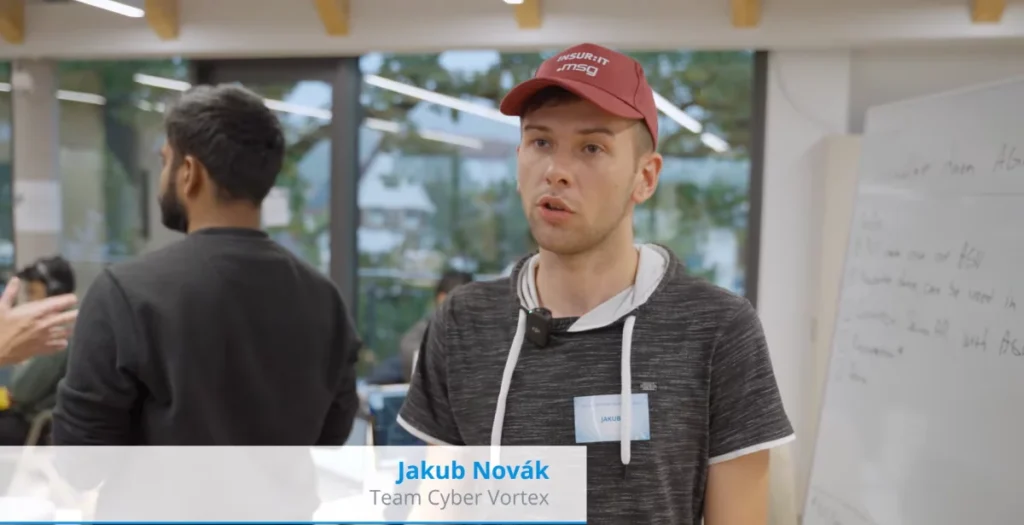Our colleague Jakub programmed robots and participated in the SICK solution Hackathon. How did it turn out?
Jakub has a close relationship to innovation. He has programmed robotic arms and participated in the SICK Hackathon. Although there are several similar hackathons organized by different companies, such as online hackathons, events like Hackathon Kosice or Hackathon Bratislava, Jakub went all the way to Germany, where he and his team were successful. Read in this interview what is the Hackathon, what it entails, what idea Jakub and his team presented and how the competition was run.

In the article you will learn:
How did you get into programming robotic arms?
It was my previous job. During my studies I learned to program PLCs, robotic arms and everything in the field of industrial automation, i.e. sensor systems, motors and so on. It was based on my field of study, which was focused on programming and design of automatic lines. Moreover, it was my hobby at the time.
Have you managed to achieve any success in this area?
Yes, after a successful presentation of my security solution, which used a laser scanner and light barriers from SICK company, I was approached by their sales manager with an offer to take part in their Hackaton tender. I agreed because it was a great opportunity to try out the R&D environment and I wanted to show that robots that can sometimes pose a danger can be integrated with humans. That was also the intention of my entire high school thesis.
I have participated in various domestic competitions such as the Technical Idea of the Year. An example of another competition is ENERSOL, where I scored points in the regional round with a project of a factory that uses IR cameras and the whole production takes place in the dark, without people and visible light. I didn’t participate in the national round, even though I was nominated.
Did you prepare for the Hackathon in any special way?
It is impossible to prepare for the Hackathon, because although we had templates of various real projects, we got the task only on the spot. Then we received the equipment and had approximately 48 hours to develop a solution. After that time, the ideas were presented and we waited to see if ours would be awarded. The whole thing meant a few days without sleep, so all I could do to prepare was get a good night’s sleep.
What were your feelings before the competition?
I was pretty freaked out because I was one of the youngest participants, if not the youngest ever to attend their Hackathon. Most of the time, it’s attended by students who are finishing college, and I only finished high school this year. I also had to travel more than 1000 kilometres by car and then spend hours solving the task with a team I didn’t know beforehand.

Who was in your team?
We called our team CyberVortex and it had five members. Apart from me, there was an Indian with a focus on robotics and augmented reality, two students from Georgia who focused on mathematics, programming and algorithm creation, and a student from Bangladesh who was an artificial intelligence expert. I think it was the perfect composition because the mathematicians thought through the algorithm and “pushed” our solution to the AWS cloud. Thanks to artificial intelligence and augmented reality, we took our project from computers to the real world and my job was to gather the information, make sure each team member had everything they needed and present the solution itself.
What competitors did you have?
The competition was open to anyone. There were students from all over the world, and not only from the IT field. Even a person with a non-technical background can participate in the Hackathon. This is done through a selection round, where they assess whether a person with a given background and experience would be an asset to the selected topics. My application included a focus on robotics and I think that my experience with systems administration, which I am currently working on within msg life Slovakia, was also successful. In the end, 107 students from 22 countries participated in the hackathon, forming 23 teams. Each participant has their participation and costs fully covered, which is not cheap at all, so the selection is very careful.
What solution have you created together?
CyberVortex focused on a cloud-based solution that collects, visualizes and analyzes data from an autonomous vehicle. So it was necessary to solve algorithms for trajectory visualization in the 3D world, processing of lidar data and sending to the Cloud. This was a solution to automate the SICK factory in Germany, where small vehicles should be able to move autonomously, which is already done, but there were some changes that needed to be made. The aim was also to speed up the identification of AGV vehicle problems.

Who won the competition in the end?
The team that created the electric car app. Such solutions already exist, of course, but the benefit of this app was that it was possible to reserve a place and then pay for charging at private stations that are not part of the major networks. However, after the competition was over, the ideas were still being consulted and it became clear that ours might be developed further by SICK.
What did you gain from participating in the Hackathon? Would you recommend it to others?
100% yes. I had the opportunity to meet other cultures, coordinate a team, keep it going and develop an interesting solution. So it wasn’t just about building hard skills, but also soft skills. All this was happening under time pressure and without sleep. One also has the opportunity to meet talented people and people from big companies, which are all valuable contacts. I was therefore happy to be able to participate
to use not only for personal visibility, but also for the visibility of msg life Slovakia, where I now work. I was losing faith in the fact that big companies in Slovakia really care about their employees, but at msg life they clearly proved to me that they really care about people and their work.
If you’re interested in Jakub’s story and would also like to pursue a career in IT, take a look at our job offers. In case you don’t find a suitable one, feel free to leave us a CV. We are always looking for young talents like Jakub.
